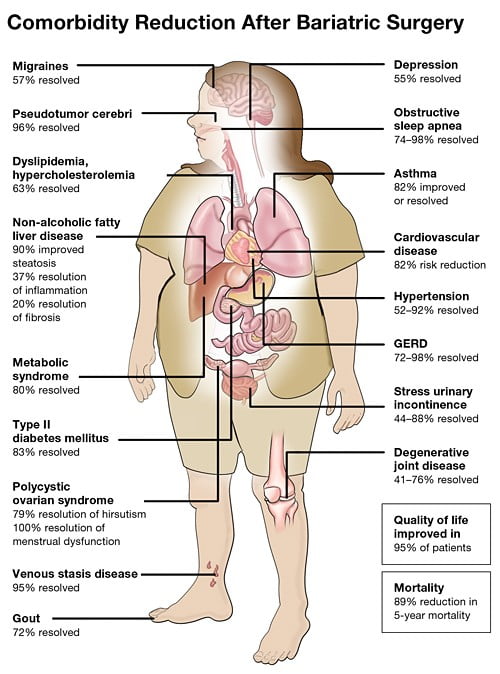
Advanced Treatments For Obesity
Obesity is a highly stigmatized medical condition and is often the source of discrimination. The fact is that obesity is a chronic health issue that affects over 40% of adults in the United States.1
Fortunately, obesity can be treated. At Florida Coast Weight Loss Center, we provide a comprehensive range of non-surgical and surgical options for lasting weight loss. We understand that the comprehensive clinical care along with compassionate emotional and nutritional support included in our advanced treatment plans can empower patients to live healthier and happier lives.
Changing Your Life Starts Today
Keep in mind that the routines and habits that brought you to a place of needing medical help weren’t formed overnight. Changing them also won’t happen overnight—it’s a process. The good news is that you’re here, so for you, that process starts today. When you partner with Florida Coast Weight Loss Center, you can feel confident that we will be by your side as you learn, understand, and incorporate all the necessary tools to ensure you reach your goal weight and maintain it long-term.

Misconceptions About Weight Loss
Contrary to popular belief, obesity isn’t only caused by overeating. People who struggle with obesity don’t lack willpower, and they aren’t lazy. And while caloric intake is often indiscriminately blamed for weight loss failures, calories are units of energy that are essential to our survival. Despite decades of failures focusing on the calories-in/calories-out model to weight loss, most programs continue to dive headlong into some caloric variation to achieve weight loss. It doesn’t work! Thankfully our understanding has evolved to a much more complex approach that involves controlling the hormones involved in driving weight gain, and subsequently, weight loss. Our in depth educational process will guide you to an understanding of these processes that will lead to healthy and sustainable weight loss.
But the problem doesn’t stop there: Starting in the 1960s, health authorities began promoting the correlation between heart disease and dietary fat, lauding carbohydrates as “Heart Healthy” foods. Roughly half a century later we have come to realize that carbohydrate-heavy diets and the resultant hormonal response are primarily responsible for the obesity epidemic of the last generation.
This illustrates why simply reducing caloric intake without factoring in the type of calories reduced will not result in successful weight loss. In addition to diet, other factors that increase the likelihood of developing obesity include genetic predisposition, environmental factors, gender, and age.
The basal metabolic rate (BMR), or the rate at which the body burns calories is also a factor. Your BMR can be impacted by brain function, stress, hormones, organ systems, and sleep cycles. It also plays an essential role in regulating weight. Disruption to your BMR can cause weight to build, and provides more proof that a weight loss strategy that relies solely on reducing calories is destined to fail.
Obesity requires a multipronged approach with bariatric surgery as the foundation and lifestyle changes, fitness, and nutrition acting as supportive pillars. While weight loss surgery can be an essential and life-saving component of treating obesity as a medical condition fundamentally as a result of the hormonal changes which occur following surgery, we believe that surgery is not a cure-all; it’s simply one of many tools that we’ll provide you with on your weight loss journey. Our medical professionals and weight loss specialists will serve as your personal guides through a customized program designed to help you reach your goal weight and empower you to live the life of your dreams.
Obesity-Related Health Risks
Individuals with obesity are at a higher risk for serious health conditions, including:
- Breathing problems
- Certain cancers2
- Coronary heart disease
- High blood pressure (hypertension)
- Type II diabetes
- Sleep apnea

How Obesity Impacts Quality of Life
Obesity can negatively impact the quality of life in many ways, and this is often compounded by prejudices and stigmas against those who struggle with this medical condition.
People who have obesity often suffer from anxiety and depression in addition to poor body image and low self-esteem. This can trap them in a dangerous cycle of unhealthy behaviors like binge eating. In addition to social and health consequences, many individuals with obesity find it disastrous to their finances. Research indicates that the cost of obesity is between $9,000 and $17,000 higher per year compared to those of average weight. These figures factor in the higher cost of medical insurance premiums, health care, and prescription medications.3

Are You a Candidate for Our Weight Loss Programs?
Take our 60 Second Assessment
Determining The Right Weight For You
There’s no universal standard for a “healthy weight”, because everybody’s composition is different. A prime example is that because muscle is denser than fat, a muscular athlete can weigh more than a person of comparable size who has a higher fat content. The Body Mass Index (BMI) is the best indication of whether a person’s weight falls into a healthy range for their height and age.4
That’s why the numbers on a scale don’t show the total picture, even if those numbers do indicate whether someone has excess body weight or not. If weight loss is your goal, establishing your unique “healthy weight” with a weight loss specialist is the way to achieve success. That way, you’re evaluating other factors including your daily level of activity, your sense of wellbeing, and your overall health, and making adjustments to your weight loss plan accordingly.
Breaking the Cycle of YoYo Dieting
Individuals struggling with obesity can be tempted to try quick fixes or fad diets. This type of weight loss—if it does result in weight loss—is typically neither healthy nor sustainable.
The outcome of yo-yo dieting for most is regaining weight. As much as 75% of lost weight is regained within one year, and all lost weight is regained in 5 years. Furthermore, the weight that is lost through the reduced calorie intake approach generally decreases metabolism. When the metabolism slows, weight gain resumes.
Weight-loss plans are only successful when fattening carbohydrates are removed from the diet. This is because it regulates insulin secretion which is directly responsible for obesity. Nutrition and diet plans that reduce the release of insulin are critical to maintaining the weight loss instigated through surgical treatment.
That’s why we don’t recommend dieting; rather we promote adopting a healthier lifestyle supported by choosing healthy food and getting regular exercise.

Exercise and Weight Management
Even though evidence suggests that exercise alone will not help maintain weight or lead to weight loss, there are good reasons why exercise should be integrated into an optimally healthy lifestyle. Physical activity increases fitness and endurance as well as reduces the risk of developing heart disease. In addition to the physical benefits of exercise, there are emotional benefits as well. The Florida Coast Weight Loss Center works with personal trainers certified by the National Academy of Sports Medicine (NASM) with corrective exercise certifications. They will work with you to develop a personal and progressive plan for regular exercise. We recommend adding the following types of exercise into your fitness regimen:
Low Impact Exercise
Low-impact exercises, such as walking, swimming, and chair yoga are great for people who struggle with mobility or are just starting out. These exercises are gentler on the joints and easier on muscles.
Aerobic Exercise
Aerobic exercises such as cycling, dance, rowing, or elliptical all increase the heart rate and improve cardiac function. Many patients looking to lose weight love swimming and cycling because they are both aerobic and low impact—providing maximum health benefits while being easiest on the body.
Resistance Training & Weight Lifting
Weight lifting and resistance training can be beneficial for people struggling with obesity because these activities preserve and build muscle mass. Strength training such as lifting weights, pushups, and squats can increase fat burning and enhance muscle tone.5
Surgical and Non-Surgical Weight Loss Options
Weight Loss Surgery to Treat Obesity
Weight loss surgery is often the best and most effective treatment for people who have been diagnosed with obesity. By changing hormonal patterns, surgery can unlock weight loss in ways that diet and exercise alone cannot and provide patients with dramatic and sustainable weight loss.
Patients who treat obesity with weight loss surgery are more likely to:
- Maintain their weight loss long-term
- Achieve Type II diabetes remission
- Improve their cardiovascular health
- Find relief from anxiety and depression
- Eliminate or reduce symptoms of sleep apnea
- Reduce muscle weakness and joint pain
- Improve fertility6
Medically Supervised Weight Loss
For patients diagnosed with obesity who don’t meet the criteria or don’t want to undergo bariatric surgery, medically supervised weight loss is a good option. We offer a 12-week ReSet-ReWire-ReYou program that is fully customizable to support each patient’s unique needs and weight loss goals.
Fit Body Boot Camp
Our partnership with Port Orange Fit Body Boot Camp helps patients build upon the foundations of a healthy lifestyle. The team at Fit Body Boot Camp can provide post-op bariatric patients with fat-burning workouts, nutritional counseling, and lifestyle coaching to help you stay on track.
FAQs About Weight Loss Options
Am I too heavy to exercise?
No, when you’re just starting out, any movement is something to be celebrated even if it’s minimal. Our fitness trainers will work with you to find an exercise that works for your body, where you’re at now, and build upon that as you increase in strength and stamina.
What if I’m not overweight enough for weight loss surgery?
Less than 1% of Americans who qualify for bariatric surgery undergo a procedure. You may be a candidate for weight loss surgery if your BMI is over 30.7
What happens after bariatric surgery?
Weight loss surgery is just the start; once you’ve achieved a healthy weight, maintaining it is a life-long commitment. That’s why enlisting the support of medical professionals, dieticians, nutritionists, and trainers is critical.
Explore Weight Loss Options At Florida Coast Weight Loss Center
The team at Florida Coast Weight Loss Center is dedicated to working with patients to achieve weight loss success and optimal health. If you live in Orlando, Jacksonville, Daytona Beach or nearby areas and are interested in learning more about your weight loss options, please contact us to schedule a consultation.

1 Centers for Disease Control and Prevention. Adult Obesity Facts. Available: https://www.cdc.gov/obesity/adult-obesity-facts/. Accessed May 19, 2020.
2 Centers for Disease Control and Prevention. Adult Obesity Causes & Consequences. Available: https://www.cdc.gov/obesity/adult-obesity-facts/. Accessed May 19, 2020.
3 Thompson D, Edelsberg J, Colditz GA, Bird AP, Oster G. Lifetime health and economic consequences of obesity. Arch Intern Med. 1999;159(18):2177‐2183. doi:10.1001/archinte.159.18.2177. Accessed May 19, 2020.
4 CDC. About Adult BMI. Available: https://www.cdc.gov/bmi/faq/?CDC_AAref_Val. Accessed June 16, 2022.
5 Willis LH, Slentz CA, Bateman LA, et al. Effects of aerobic and/or resistance training on body mass and fat mass in overweight or obese adults. J Appl Physiol (1985). 2012;113(12):1831‐1837. doi:10.1152/japplphysiol.01370.2011. Accessed May 19, 2020.
6 Cleveland Clinic. 7 bariatric surgery benefits besides helping you lose weight. Available: https://health.clevelandclinic.org/7-bariatric-surgery-benefits-besides-helping-you-lose-weight/. Accessed May 19, 2020.
7 Bhogal SK, Reddigan JI, Rotstein OD, et al. Inequity to the utilization of bariatric surgery: a systematic review and meta-analysis. Obes Surg. 2015;25(5):888‐899. doi:10.1007/s11695-015-1595-9. Accessed May 19, 2020.
The surgeons at Florida Coast Weight Loss Center have either authored or reviewed and approved this content.
Page Updated:
